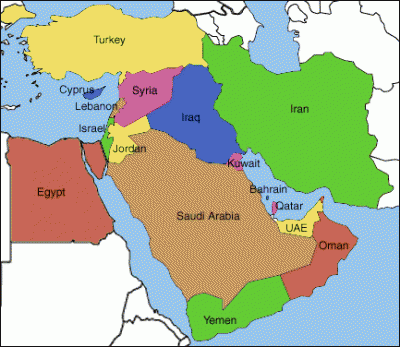Here is a story from last week that I never got around to mentioning (thanks to a reader for sending it). Lebanon is being overwhelmed by the arrival of Syrian refugees and anger and resentment is growing among the Lebanese. What! I thought Muslims were the most welcoming people in the world (that’s what the UN told us, here).
Before I get to the story, check out this map of Syria and its neighbors. Do you know who isn’t taking any refugees? Uber-wealthy Saudi Arabia, as we learned recently, is the fifth most-desired destination for would-be migrants following, the US, the UK, Canada and France, but has closed its door to refugees. The UN never criticizes Saudi Arabia for wanting to keep their country wealthy and for their own kind of people. And, I bet all those Muslims (29 million!) who want to live in S.A. believed the myth about Islamic charity too!

Stories like this one at the Los Angeles Times will be used to soften you up for when the refugee advocates begin clamoring (probably in May!) for you to “welcome” some nice Syrians to your towns and cities.
TRIPOLI, Lebanon — Khaled Naaman doesn’t hide his disdain for the Syrian government, a widely shared sentiment in this northern Lebanese city, where many harbor dark memories of Damascus’ years of military occupation.
His impoverished neighborhood, Bab Tabbaneh, stands as a bastion of support for Syrian rebels seeking to oust President Bashar Assad; their tricolor banner flutters from buildings and is spray-painted on walls. The district has also welcomed multitudes of refugees seeking to escape the Syrian conflict.
But now after almost two years of a steady influx of displaced Syrians, Naaman and other Lebanese citizens in Bab Tabbaneh are growing weary. Many blame the newcomers for shrinking wages and job opportunities and increasing rents and prices for groceries, car repairs and necessities.
“Syrians are everywhere and they are taking jobs,” said Naaman, a grizzled native of Tripoli in his mid-40s who ekes out a living selling vegetables, having retired from his position as a right-hand man for a now-deceased leader of one of this city’s many militias.
The anger vented by Naaman and others is indicative of a growing unease across Lebanon about the steady stream of refugees, who they fear may destabilize Lebanon’s brittle political and social balance.
Each day, as many as 1,000 Syrians enter Lebanon, a nation of 4.5 million people wedged between Syria, Israel and the Mediterranean Sea. Lebanon, about a quarter the size of Switzerland, sits astride some of the Middle East’s most volatile sectarian and ethnic fault lines.
More than 400,000 Syrians have fled to Lebanon since the uprising began two years ago, authorities say, adding to a sizable Syrian population already here.
Unlike in Turkey, Jordan and Iraq, other major destinations for Syrian refugees, there are no formal camps in Lebanon. Lebanese leaders are loath to go that route, recalling how semiautonomous Palestinian enclaves helped detonate the Lebanese civil war, a sectarian bloodletting that lasted from 1975 to 1990 and left about 150,000 dead and much of the country in ruins. The Syrian military entered Lebanon in 1976 and didn’t exit until 2005, after allegations it was involved in the assassination of former Lebanese Prime Minister Rafik Hariri.
There is more, read it all.
Go here for our archive on Syrian refugees (so far!).
